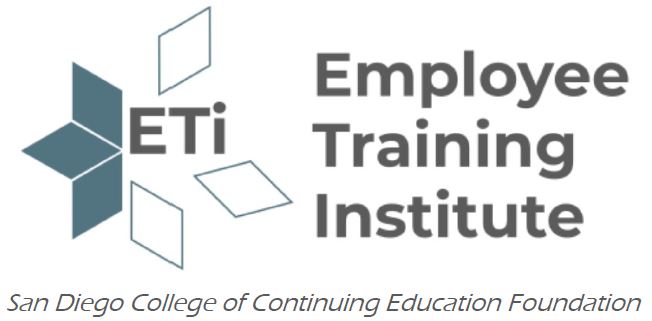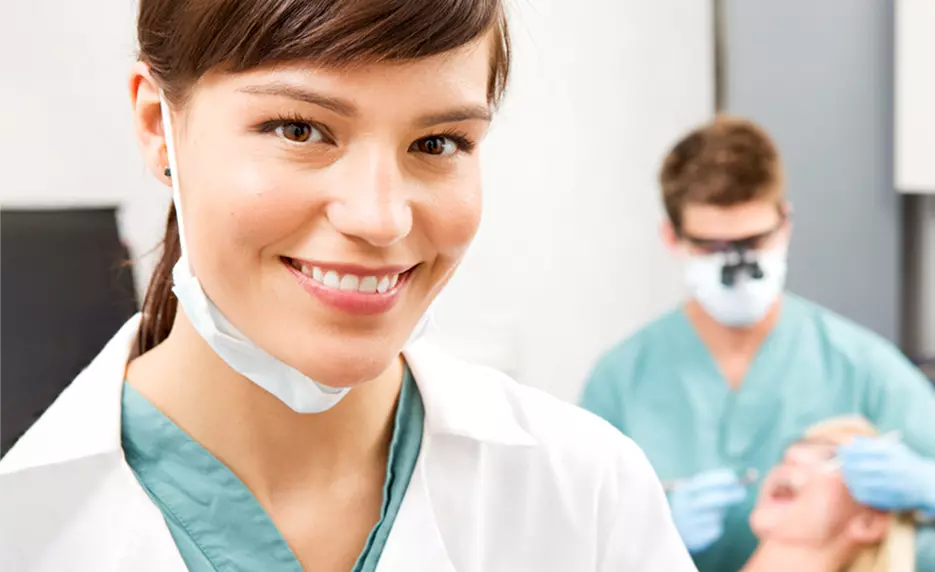Prepare for the Certified Dental Assistant (CDA) Exam Online
Dental assistants play a valuable role on any dental care team. This 100% online course will help you gain the technical skills you need to join a dental office as a clinical dental assistant. You will be ready to pass Radiation Health and Safety and Infection Control components of the Certified Dental Assistant (CDA) Exam.
Registration and Enrollment
This course is 100% online. Start anytime!
Course Details
What you will learn
- Describe the roles for each member of the dental team and twelve dental specialties
- Define the legal and ethical practice of dental assisting, including HIPAA
- Explain deciduous and permanent dentition along with their functions in dental anatomy and pathology
- Describe the chain of infection, transmission routes, and infection control for the dental practice, along with OSHA regulations
- Summarize the role of the dental assistant in pharmacology, nutrition, and interaction with a variety of patients in normal daily activities and emergency situations
- Describe the use, care, and preparation of dental instruments for patient care
- Outline the necessary components of a patient record prior to dental charting
- Use charting techniques to identify dental restorations and disease to create a treatment plan to prevent future disease progression
- Set up equipment for anesthesia and sedation.
- Describe patient clinical methods and techniques to prevent dental disease
- Identify the process of exposing high-quality radiographs in both traditional and digital formats
- Describe dental materials, their uses in dental treatment, and skills needed to use them efficiently
- Define the dental assistant’s role in pediatric dentistry, orthodontics, endodontics, prosthodontics, and cosmetic dentistry
- Explain the communication and business needs to maintain a dental business office
- State transferable hard and soft skills in order to complete a résumé for a dental assistant position
How you will benefit
- Real-world perspectives from experienced dental assistants
- Essential information about anatomy and physiology, preventive dentistry, patient care, and communication, radiology, pharmacology, anesthesia, assisting in specialty practices, employment strategies, and much more
- Explore the basics of maintaining computerized clinical dental records using Dentrix Practice Management software
OVERVIEW OF THE DENTAL PROFESSION
Introduction to the Practice of Dentistry
DENTAL HEALTH AND DISEASE
Oral health and preventative techniques; etiology of dental disease
ANATOMY AND PHYSIOLOGY
Basic human physiology, embryology and histology; head and neck anatomy
INFECTION CONTROL
Microbiology, infection control and managing hazardous materials
BASICS OF DENTAL ASSISTING
Patient care, dental charting and pharmacology; anesthesia and sedation, chair-side assisting and dental instruments and tray setups
RADIOLOGY
Producing and processing quality radiographs; extraoral and digital radiography
DENTAL MATERIALS
Dental cements, bases, liners, and bonding agents; restorative materials, dental dams, matrix, and wedges
DENTAL ASSISTING IN THE SPECIALTY PRACTICE
Oral pathology and maxillofacial surgery; endodontics, pediatric dentistry, periodontics and prosthodontics
DENTAL OFFICE MANAGEMENT
Records management; administrative techniques
There are no prerequisites for this course.
Hardware Requirements:
- This course can be taken on either a PC, Mac, or Chromebook.
- The optional Dentrix software requires a PC and cannot be used on a Chromebook or Mac.
Software Requirements:
- PC: Windows 10 or later.
- Mac: macOS 10.10 or later.
- Browser: The latest version of Google Chrome or Mozilla Firefox is preferred. Microsoft Edge and Safari are also compatible.
- Microsoft Word Online
- Adobe Acrobat Reader
- Software must be installed and fully operational before the course begins.
Other:
- Email capabilities and access to a personal email account.
Optional Dentrix Software Requirements*
- Operating System Windows* 7 Sp1, 8.1, 10
- Memory 8 GB RAM
- CPU 4 cores at 2.4 GHz
- Local Drive Install Space 40 GB total, 5 GB on C: drive
- Monitor 1280×1024
*Students are not required to download the software to complete the course requirements and can follow along with the video tutorials.
Instructional Material Requirements:
The instructional materials required for this course are included in enrollment. The following textbooks will be shipped to you approximately 7-10 business days after enrollment:
- Dental Assisting: A Comprehensive Approach,
- Dental Assisting Instruments and Materials Guide
- Dental Terminology
- Flossing and Brushing Teaching Model
- Dental Assisting Coloring Book
- Dentrix Software (online download) *You are not required to download the software to complete the course requirements and can follow along with the video tutorials.
Cindy Lamkin
Cindy Lamkin has been employed in the dental field for over 20 years. She graduated from the University of South Dakota with a degree in dental hygiene and holds Registered Dental Assistant and Registered Dental Hygienist credentials. In addition to practicing clinical hygiene, she has also worked in dental office administration and treatment coordination. Her career includes general dentistry, as well as specialty practices of periodontics, endodontics, pedodontics, and orthodontics.
$2,995.00 (USD) per person.
This course is 100% online.
| Course Hours | Duration | Start Dates |
|---|---|---|
| 300 Course Hrs | 12 Months | Start anytime! |
Job Outlook
According to the Bureau of Labor Statistics, the average salary of a clinical dental assistant is currently just under $38,000 per year.
FAQs
WHAT DOES A CLINICAL DENTAL ASSISTANT DO?
Clinical dental assistant jobs vary based on the dental office and the state your work in. Typical duties include preparing patients for treatment, sterilizing tools, instructing on proper dental hygiene, passing instruments to the dentist during procedures, keeping records of treatments, scheduling appointments and processing x-rays.
HOW LONG WILL IT TAKE TO BECOME A CLINICAL DENTAL ASSISTANT?
Most clinical dental assistant training programs can be completed in one year or less. This does not include the time you will spend working in an externship or similar position to gain experience in the field. It also does not include the required two years of work experience you will need to become certified.
WHAT ARE THE REQUIREMENTS TO BECOME A CERTIFIED DENTAL ASSISTANT?
To become a Certified Dental Assistant, you will need to pass the three components of the Dental Assisting National Board (DANB) Certification Exam and meet the Board’s work experience requirements. You will need to pass the Radiation Health and Safety, Infection Control, and General Chairside components of the DANB Certification Exam as well as complete at least two years of work experience (or a minimum of 3,500 hours accrued over a two to four year period).
WHAT KIND OF HOURS DO CLINICAL DENTAL ASSISTANTS WORK?
Most dental assistants work a full time schedule of 40 hours per week, however there are some dental assistants that work part time. Many of the hours will be worked during the day, but depending on your dental office, you may be asked to work some evenings or weekends.
WHERE DO CLINICAL DENTAL ASSISTANTS WORK?
Almost all clinical dental assistants work in dental offices under the supervision of dentists, though some may find employment with the government or in physicians’ offices. Dental assistants work very closely with dental hygienists. In this position, you will be on your feet for large portions of the day and wear surgical masks, safety goggles, gloves, and protective clothing to prevent the spread of infectious diseases.
IS A CLINICAL DENTAL ASSISTANT THE SAME AS A DENTAL HYGIENIST?
No, a dental assistant and a dental hygienist are not the same. A dental assistant directly supports a dentist with small, supervised jobs performed on patients’ teeth and administrative tasks in the office. A dental hygienist will work one-on-one with patients with less supervision. A dental assistant can practice after earning a dental assistant training certificate while a dental hygienist must obtain an associate degree in dental hygiene at minimum.
“My teacher was AMAZING! The student support was very helpful and overall it was a wonderful experience.”
M.P., Lincoln University

